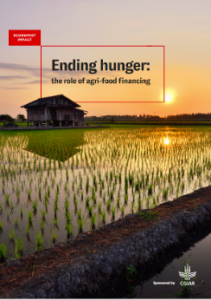
Reforming global aid and finance would make ending hunger an ‘affordable goal’, finds new report
Experts call for more and longer-term funding to tackle systemic causes of hunger and break the cycle of emergency food aid as World Bank meets in Washington DC
Analysis carried out by Economist Impact with global agrifoods-focused research partnership CGIAR showed that increases in development funding alone have been insufficient to bring down food insecurity, with almost 670 million people projected to face hunger by 2030.
The report found that too little investment had been directed towards long-term improvements in food production, with less than 7.5 per cent of overseas aid spent on research and innovation to tackle the root causes of hunger and malnutrition in 2021. Almost half of overseas development assistance (ODA) for food and agriculture was spent on food aid.
The report, Ending hunger: the role of agri-food financing, highlighted an estimated funding gap of $33-50 billion a year, of which at least US$14 billion would need to come from ODA. Among its recommendations was a reform of international financing institutions (IFIs), such as the World Bank and IMF, including a reallocation of unused currency reserves known as Special Drawing Rights from high-income countries to low-income countries.
“While humanitarian food aid is a natural response to a crisis, funding research and innovation allows us to break free of the crisis response cycle and build long-term resilience,” said Claudia Sadoff, executive managing director of CGIAR, which supports science, research and innovation for greater food security across the Global South.
“Investment in innovation takes time to bear fruit, but it pays off forever. With urgent action and growing investment, an end to world hunger, and the possibility of sustainable food systems, are within reach.”
As part of the report, the authors interviewed development experts including Prasad Gopalan, Former Global Sector Manager, Agribusiness and Forestry at IFC; Rasmus Egendal, Deputy Director, Government Partnership Division, World Food Programme (WFP); and Saharah Moon Chapotin, Executive Director, Foundation for Food & Agriculture Research.
To increase the volume and impact of funding for more resilient food systems, the report made three recommendations, which included scaling up ODA, tapping new sources of private sector funding, and maximizing existing investments.
The report was published as the World Bank and IMF hold their spring meetings in Washington D.C. amid rising pressure to increase support for low-income countries to address the ongoing food, climate and debt crises.
“IFIs could do more to provide support. There is definitely progress, but not at the pace that we need to see it,” Rasmus Egendal, Deputy Director, Government Partnership Division, World Food Programme (WFP), told the report authors.
“We are not seeing a commensurate increase in investment in longer-term food security. This only adds pressure on humanitarian needs.”
Experts emphasised the disproportionate impact of systemic improvements in agriculture on reducing hunger. For example, a single percentage point increase in annual growth of agricultural production in Nigeria has been found to lift six million people out of poverty. Similarly, giving small-scale farmers modern storage equipment – such as hermetic silos and storage bags – can reduce food loss by 40 per cent, ensuring more food reaches supply chains.
“Investment in agriculture can be an engine for economic growth [by] alleviating poverty and giving people the ability to purchase the food they need,” said Saharah Moon Chapotin, executive director of the Foundation for Food & Agriculture Research.
ENDS
About CGIAR
CGIAR is a global research partnership for a food-secure future. CGIAR science is dedicated to transforming food, land, and water systems in a climate crisis. Its research is carried out by 13 CGIAR Centers/Alliances in close collaboration with hundreds of partners, including national and regional research institutes, civil society organizations, academia, development organizations and the private sector. www.cgiar.org
We would like to thank all Funders who support this research through their contributions to the CGIAR Trust Fund.
About Economist Impact
Economist Impact combines the rigour of a think-tank with the creativity of a media brand to engage a globally influential audience. We believe that evidence-based insights can open debate, broaden perspectives and catalyse progress. The services offered by Economist Impact previously existed within The Economist Group as separate entities, including EIU Thought Leadership, EIU Public Policy, Economist Events, EBrandConnect and SignalNoise.
Our track record spans 75 years across 205 countries. Along with creative storytelling, events expertise, design-thinking solutions and market-leading media products, we produce framework design, benchmarking, economic and social impact analysis, forecasting and scenario modelling, making Economist Impact's offering unique in the marketplace. Visit www.economistimpact.com for more information.
Donna Bowater
Marchmont Communications
+44 7929 212534
donna@marchmontcomms.com
Distribution channels: Agriculture, Farming & Forestry Industry, Banking, Finance & Investment Industry, Human Rights, Science, World & Regional
Legal Disclaimer:
EIN Presswire provides this news content "as is" without warranty of any kind. We do not accept any responsibility or liability for the accuracy, content, images, videos, licenses, completeness, legality, or reliability of the information contained in this article. If you have any complaints or copyright issues related to this article, kindly contact the author above.
Submit your press release

